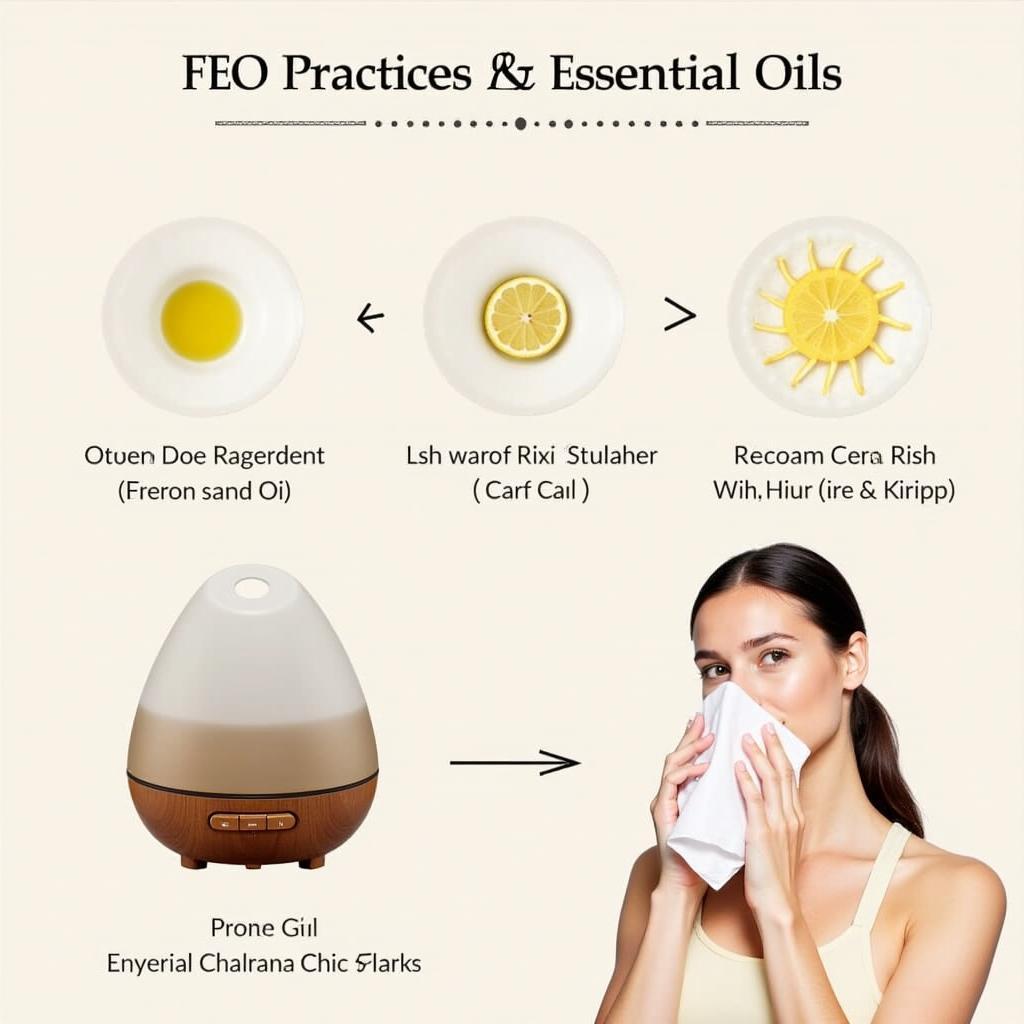
Essential Oil Clashes for Cancer Patients: Navigating Aromatherapy Safely
- AmazoniaSilva
- Tháng 12 20, 2024
- Zodiac signs
- 0 Comments
Essential oil clashes for cancer patients are a critical consideration when using aromatherapy. While essential oils can offer numerous benefits like stress reduction and improved sleep, some oils can interact negatively with cancer treatments or exacerbate certain symptoms. Understanding these potential clashes is vital for safe and effective aromatherapy use.
Understanding Essential Oil Clashes
Essential oils, despite their natural origin, are potent substances with complex chemical compositions. These compounds can interact with medications, including chemotherapy drugs, radiation therapy, and targeted therapies, potentially leading to reduced efficacy or increased side effects. Additionally, some oils can stimulate hormone production, which can be detrimental to certain types of cancer. It’s essential to approach aromatherapy with caution and awareness, especially during cancer treatment.
Common Essential Oil Clashes for Cancer Patients
Some essential oils are generally advised against for cancer patients due to their potential interactions or stimulating effects. These include:
- Fennel, anise, and clary sage: These oils contain estrogen-like compounds that could stimulate hormone-sensitive cancers.
- Citrus oils expressed from the peel (like lemon, orange, and grapefruit): These can increase photosensitivity, making skin more susceptible to sunburn, especially during radiation therapy.
- Oils high in phenols (like oregano, thyme, and clove): These can be irritating to the skin and mucous membranes, which are often sensitive during cancer treatment.
Choosing Safe Essential Oils During Cancer Treatment
While some oils pose risks, many others can be beneficial and safe for cancer patients when used correctly. Lavender, chamomile, and sandalwood are often recommended for their calming and relaxing properties. Ginger and peppermint can help alleviate nausea, a common side effect of chemotherapy.
Always consult with a qualified aromatherapist and your oncologist before using any essential oils during cancer treatment. They can advise you on which oils are safe and appropriate for your specific situation, considering your cancer type, treatment plan, and overall health.
How to Use Essential Oils Safely
Even with safe essential oils, it’s crucial to use them properly. Always dilute essential oils in a carrier oil (like jojoba or almond oil) before applying them to the skin. Start with a very low dilution (1-2%) and gradually increase as tolerated. Avoid applying oils directly to broken or irritated skin. Inhalation is another safe method, using a diffuser or inhaling directly from a tissue or cotton ball.
 Safe Essential Oil Practices During Cancer Treatment
Safe Essential Oil Practices During Cancer Treatment
Essential Oil Clashes and Chemotherapy
Chemotherapy drugs can interact with certain essential oils, affecting their metabolism or efficacy. For example, some oils can inhibit or induce liver enzymes responsible for drug metabolism, potentially leading to either toxic buildup or reduced effectiveness of the chemotherapy. It’s vital to discuss any essential oil use with your oncologist before and during chemotherapy.
Essential Oil Clashes and Radiation Therapy
Radiation therapy can make the skin more sensitive and susceptible to irritation. Citrus oils, especially those expressed from the peel, can exacerbate this sensitivity and increase the risk of sunburn. Avoiding these oils during radiation therapy is recommended.
Conclusion
Navigating essential oil clashes for cancer patients requires careful consideration and professional guidance. While aromatherapy can offer supportive care, it’s crucial to prioritize safety and avoid potential interactions with cancer treatments. By consulting with your healthcare team and a qualified aromatherapist, you can make informed decisions about essential oil use and integrate aromatherapy safely into your cancer care plan.
FAQ
- Can I use any essential oil during cancer treatment? No, certain essential oils can interact negatively with cancer treatments. Consult with your oncologist and a qualified aromatherapist before using any essential oils.
- Are all citrus oils unsafe during cancer treatment? Citrus oils expressed from the peel can increase photosensitivity, making them potentially unsafe during radiation therapy.
- How should I dilute essential oils for topical use? Start with a very low dilution (1-2%) in a carrier oil and gradually increase as tolerated.
- Can essential oils cure cancer? No, essential oils are not a cure for cancer. They can be used as supportive care to manage symptoms like stress and nausea.
- Where can I find a qualified aromatherapist? You can search for certified aromatherapists online or ask your healthcare provider for recommendations.
- What are some safe essential oils for cancer patients? Lavender, chamomile, and sandalwood are often recommended for their calming properties. Ginger and peppermint can help with nausea.
- Can I use essential oils with chemotherapy? Discuss any essential oil use with your oncologist before and during chemotherapy due to potential interactions.
More questions? Check out these other articles on our website:
- Aromatherapy for Cancer Patients: A Guide to Safe Practices
- Understanding Essential Oil Interactions with Medications
- Managing Cancer Treatment Side Effects with Natural Remedies
Need support? Contact us at [email protected] or visit us at Fifth Avenue, 34th Floor, New York, NY 10118, USA. We have a 24/7 customer support team.